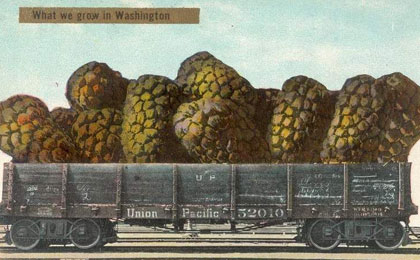
Please don’t consider this a political post, but I’m wondering why neither of the two recipes for honey beers released over the weekend by the White House includes American hops.
One calls for Kent Golding and Fuggle, the other for whatever provides enough bittering punch and Hallertau (I’m guessing Mittelfrüh, but I wish they’d been specific). Farmers in the Northwest plant a bit of Fuggle and Golding, but those varieties originated in England and that’s where most are grown. Hallertau, of course, is the largest hop growing region in Germany.
(As an aside, the recipe for White House Honey Ale specifies 1.5 ounces each of Golding and Fuggle, but in the step-by-step directions only refers to .5 of Fuggle. Am I overlooking something? I’m prepared for an embarrassing answer.)
These are honey beers, not “hop bombs.” I get it. Made with honey produced by White House bees. And there this link to George Washington and Thomas Jefferson to preserve. But where are the jobs related to American beer being created these days? At small breweries. And where do about 80 percent of those hops small American breweries are using come from? American farmers. Am I the only one who sees a nicely balanced partnership?
To give you an idea of the impact of breweries that produce only 6% of the nation’s beers have on hops, a bit of math.
In 2011, American beer production shrank 4.6 million barrels. The companies the Brewers Association defines as “craft” (and referred to as craft throughout the rest of this post) made 1.3 million more barrels. Without them, production might have been down 5.9 million barrels (maybe not quite that, because people might have bought substitutes for “craft” beer). On a worldwide basis, best guess is that brewers use on average about 2 ounces of hops per barrel they brew (the math gets tricky because most brew with hop extracts, so you have to consider how much hops that takes to produce, figure in higher utilization, and so on).
According to a BA survey, American brewers use about one pound per barrel, a number that is going up as drinkers buy still more IPAs (now 18% of craft sold and close to three times more than five years ago). So craft brewers needed at least 1.3 million pounds more hops in 2011. The other brewers needed 750,000 pounds less (to brew 4.5 times more beer). Hop sales went up.
Just to be clear. Somebody at the White House brewing beer: cool. Using malt extract: fine. Honey beer: great idea. Posting a slick video: I watched to the end. Using imported hops: hey, I love them (Tettnang Tettnanger, Spalt Spalter, Saaz, Hersbrucker, Strisselspalt. I’m a fan. Golding and Fuggle, too).
But where iss the story in American beer today, what ingredient is an important part of that story, and who is growing that ingredient?
Rhetorical questions.
 Jim Koch sent a big old hops valentine to smaller breweries on Thursday. Ten tons worth.
Jim Koch sent a big old hops valentine to smaller breweries on Thursday. Ten tons worth.